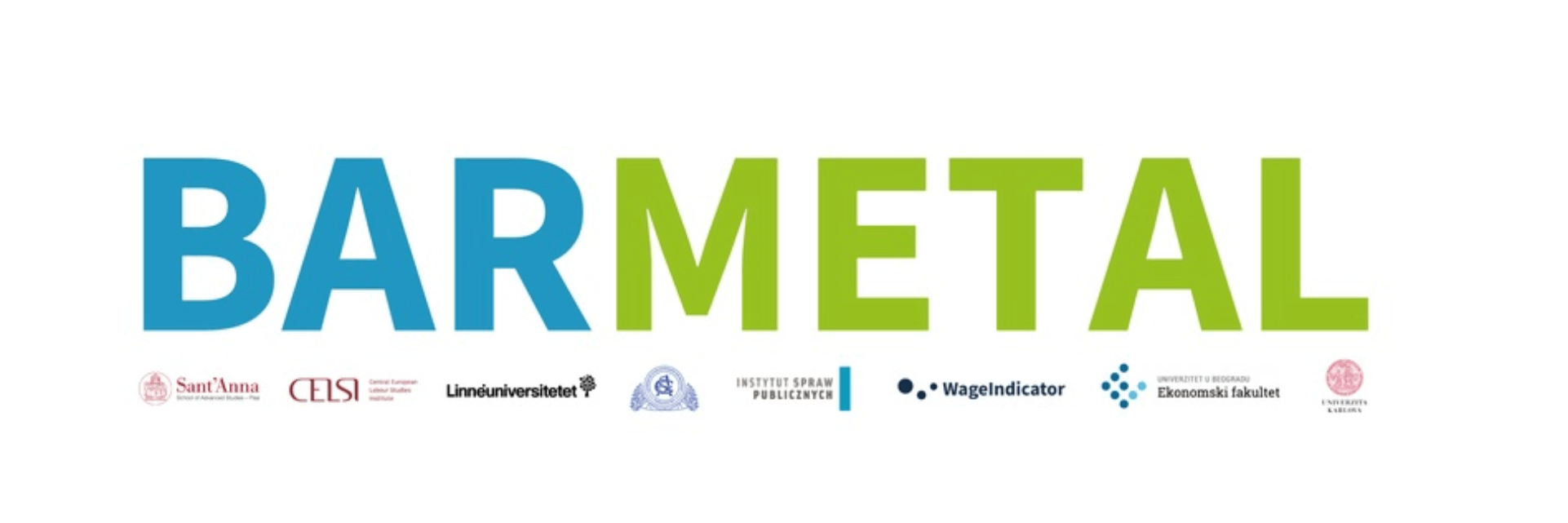June 17, 2024
The Mutual Learning Event brought together representatives of employers and employees fromSlovakia, the Czech Republic, Poland and Germany

50
2022 - 2024
Project number:
101052331
European Commission & European Social Fund Plus (ESF+)

The BARMETAL project seeks to analyse the current situation and opportunities for strengthening collective bargaining in the metalworking industry in conditions of technological change, including in particular digitalization, automatization and decarbonization.
With this focus, the project directly responds to evidence that the COVID-19 pandemic accelerates the technology dissemination and the digital transformation of metal, engineering and tech-based industries and workplaces. It has increased the urgency and need for social partners to find joint approaches to manage a swift and sustainable digital transformation.
Ceemet and IndustriAll Europe, the EU-level social partners in the metalworking industry, have published their joint vision of the challenges and opportunities of digitalization for workers and employers.
The BARMETAL project responds to these challenges and EU-level priorities in sectoral social dialogue and deepens the expertise in industrial relations by analyzing both the bargaining processes and outcomes (stipulations in collective agreements) across 12 EU Member States and 1 candidate country.
The project explores how the challenges for working conditions, such as intensification of work, vocational education and changing demands for workers’ skills in metalworking companies across the EU create opportunities for strengthening collective bargaining at the workplace and sector levels.
The project places high priority on mutual exchange and learning tools among social partners between those member states that have a highly developed collective bargaining already and those where bargaining needs to be enhanced and strengthened.
The BARMETAL project thus provides expertise for enhancing industrial relations and establishes extensive interaction and cooperation between research partners and social partners.
Key research objectives:
Research questions:
RQ1. What processes, derived from the ongoing technological and ecological changes, in particular, digitalization, automatization and decarbonization, have an impact on working conditions and the quality of jobs?
RQ 2. What are the main challenges/changes relevant for working conditions with respect to digitalisation, automatization and decarbonization in the metalworking industry across the EU Member States and Candidate Countries? How are new forms of work and training related to these changes, covering a period from 2017 and 11 Member States (CZ, DE, DK, FR, HU, IT, NL, PL, RO, SK, SE), addressed or can be addressed via collective bargaining?
RQ 3. To what extent is the metalworking industry (defined any sector connected to metal production and processing, including the NACE classification sectors C, in particular, C24, C25 and C29) covered by multi- or single-employer Collective Bargaining Agreements (CBA) since 2017, and which sub-industries or enterprises are predominantly not covered across the studied 12 countries? How has collective bargaining addressed the technological challenges and what has been agreed in CBAs regarding the main changes identified in RQ1 in the five-year period?
RQ 4. How are the EU-level priorities regarding the impact of technological and ecological changes transposed to the priorities of EU-level sectoral social dialogue in the metalworking industry, and what implementation measures do EU-level social partners and other stakeholders expect and recommend facing these changes at workplaces across companies in the EU Member States and Candidate Countries?
RQ 5. How to disseminate recommendations for social partners regarding bargaining provisions and bargaining practices to incorporate new clauses dealing with changes related to digitalization, automatization and decarbonization in their CBAs? How to ensure that a wide audience is reached across the whole EU and beyond, in addition to stakeholders at the EU-level and in the studied 12 countries?
RQ 6. What are the legal and the organisational conditions for a continuous, successful multi- or singleemployer collective bargaining in the metalworking industry in the studied 12 countries and which of these conditions are missing in countries with absent or not-successful bargaining? How can bargaining in these countries be strengthened for addressing the workplace changes induced by digitalization, automatization and robotization?
RQ 7. Which best practices and CBA clauses can be identified in addressing the workplace changes induced by digitalization, automatization and decarbonization via collective bargaining can be identified and how can they be transposed to other countries? What can social partners in countries with underdeveloped bargaining or with CBAs without such clauses learn from social partners CBAs with such clauses?
WORK PACKAGES:
WP1: Project management and quality assurance
WP2: Conceptualizing digitalization, automatization and decarbonization as opportunities and challenges for adapting collective bargaining in the metal sector
WP3: Country case studies on collective bargaining processes in the metal sector
WP4: Collection and analysis of CBAs in the metal sector – bargaining outcomes in response to digitalization, automatization and decarbonization
WP5: The EU-level dimension of bargaining transformations in the metal sector – policy responses by EU-level social partners
WP6: Innovative ways to support the strengthening of bargaining: videos, webinars, toolkits, factsheets, social media campaigns
WP7: Policy recommendations for strengthening collective bargaining
WP8: Mutual learning for social partners: how to strengthen collective bargaining in the metal sector in response to digitalization, robotization and decarbonization
COUNTRY VIDEOS:
D 6.1 - BARMETAL video Czechia: https://youtu.be/spF2CgNCBB0
D 6.1 - BARMETAL video Denmark: https://youtu.be/k12RU7CD8wI
D 6.1 - BARMETAL video France: https://www.youtube.com/watch?v=8PtnUX9Rdbc
D 6.1 - BARMETAL video Hungary: https://youtu.be/DSGFTP3wST0
D 6.1 - BARMETAL video Italy: https://www.youtube.com/watch?v=ggcg69A2TYc
D 6.1 - BARMETAL video Netherlands: https://www.youtube.com/watch?v=Rz1n7P4gdz0
D 6.1 - BARMETAL video Poland: https://youtu.be/TU7vvDqhmuE
D 6.1 - BARMETAL video Romania: https://www.youtube.com/watch?v=zlqaC_Isg_U
D 6.1 - BARMETAL video Slovakia: https://youtu.be/7js0zsggz-I
D 6.1 - BARMETAL video Sweden: https://youtu.be/xnvBanIesCA
D 6.1 - BARMETAL video Serbia: https://youtu.be/2cejgzINd8s
D 6.1 - BARMETAL Comparative video: https://www.youtube.com/watch?v=QDCJEKvaiiU
Project events
Sept. 20, 2024
June 17, 2024
The Mutual Learning Event brought together representatives of employers and employees fromSlovakia, the Czech Republic, Poland and Germany
June 12, 2024
The Mutual Learning Event brought together representatives of employers and employees from The Netherlands, Italy, France and Romania
April 6, 2024
April 6, 2024
Barmetal mid-term conference in Pisa
Dec. 1, 2023
The midterm workshop for the BARMETAL project took place on December 1st, 2023
Jan. 27, 2023
Partners of the BARMETAL project held a second monthly meeting on January 27th, 2023
Dec. 22, 2022
BARMETAL held its first monthly meeting on December 22, 2022
Nov. 22, 2022
Nov. 22, 2022
BARMETAL Kick-off meeting on November 22, 2022